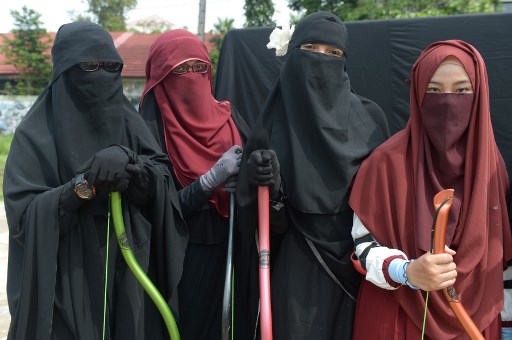The recent appointment of Religious Affairs Minister Fachrul Razi was mired in controversy, with religious organizations decrying the fact that the former military general, who never held a post in a religious office, was picked for the role. And now, the minister may face further scrutiny from both religious groups and freedom of expression advocates alike over a potential religious clothing ban.
During a speech at a discussion event with Islamic religious leaders in Central Jakarta yesterday, Fachri touched on the possibility that the government may enforce a limited ban on the niqab (face veil adorned by many Muslim women) for reasons related to security.
“There may be further steps taken, but we are not banning the niqab [outright], we are looking into banning [people wearing them from] entering government institutions, particularly in light of the attack on Wiranto a while back,” Fachrul said, as quoted by CNN Indonesia.
The minister was referring to the assassination attempt on former Chief Security Minister Wiranto earlier this month by two IS-linked militants. The attack put authorities on high alert, leading to the arrest of dozens of suspected militants since.
Justifying the proposed niqab ban, Fachrul said that the niqab is often mistaken as a religious requirement when, in fact, it’s a tradition passed down by certain Middle Eastern tribes, like in Saudi Arabia, who have increasingly let go of the garment in recent times.
“We want to convey that [the niqab] is not a measure of one’s piety and devotion,” he said.
The minister did not explain if the proposed ban would only apply to public servants or if the general public would also be prohibited from wearing the face veil when entering government buildings.
Muhammadiyah, one of Indonesia’s — and the world’s — largest Islamic organizations, say that the proposed niqab ban would not violate Islamic values as it does not view face veils as mandatory in Islam based on its interpretation of the Quran and other religious texts.
However, the Indonesian Ulema Council (MUI), the country’s highest clerical body, warned the government not to stir controversy with the proposed niqab ban and reminded them that the Constitution protects citizens’ right to uphold their religious beliefs.
In recent years, prohibiting the niqab has proved to be a highly contentious policy in Indonesia. Last year, an Islamic university in Yogyakarta banned face veils over fears of religious radicalism, but the ban was soon revoked following criticisms from feminists, politicians and Islamic scholars.
Although Indonesia is a Muslim-majority country in which a large percentage of Muslim women wear hijab (headscarves), the number of women who wear the niqab is relatively quite small (though there is evidence to suggest it is becoming somewhat more mainstream). But many who wear the face veil here say they are still looked upon with suspicion and are regularly asked questions such as “why are you dressed like a terrorist?”




